Ontario Superior Court rules on trespass act challenge

Some sections of Ontario’s so-called ag gag law have been struck down by the province’s Superior Court.
Read Also

Worrying trends in farm safety emphasize need for better procedures
A recent presentation at the Ottawa Valley Farm Show highlighted the nuances of employee safety on farms and the need…
The law faced a recent constitutional challenge in Ontario’s top court by activist groups.
Superior Court Judge Markus Koehnen delivered his decision in on Apr. 2, saying certain provisions within the Security from Trespass and Protecting Food Safety Act, 2020 violate the right of freedom of expression under the Canadian Charter of Rights and Freedom, declaring them to have no force or effect.
The Act was developed to deter activist disruptions of farm and food processors, and closed the gap in previous laws to protect the agriculture sector against trespassing. Ontario farm groups expressed concern that trespassers entering buildings or farm property without permission could pose biosecurity risks.
Protests by animal activists outside of the Fearman’s Pork plant in Burlington also led to the accidental death of a protestor in 2020, who was killed by a livestock transport truck entering the plant property.
Activist however called the Act an “ag-gag” law, and officially challenged the Act’s constitutionality, filing an appeal with the Ontario Superior Court in March 2021.
The case was finally heard in court over three days late last year, wrapping up on Nov. 1, 2023.
Koehnen ruled Sections 5(4), 6(2) and 6(4) under Ontario’s Security from Trespass and Protecting Food Safety Act (Act), prohibiting the interference or interaction of a farm animal in an agricultural zone and during transportation without prior consent from the owner/operator or driver to be void if obtained by false pretenses or duress, do not infringe on Charter rights.
“The Charter was never intended to give one person the right to physically interact with another person’s property without the other’s consent under the guise of freedom of expression,” explained Koehnen in his decision.
Although Section 5(6), which voids consent to be on an agricultural premise if obtained under false pretenses, and 6(4), under duress, didn’t void Charter rights, the “prescribed circumstances” in which consent is revoked, set out in Section 9 of the Ontario Regulation 701/20 (Regulation), does.
“In my view, s. 9 of the Regulation is overly broad and disproportionate. It penalizes misstatements like denying affiliation with an animal rights group or having a university degree,” said Koehnen in the decision. “Those sorts of misstatements have no bearing on objectives like animal safety or food security.”
Section 10, which only minimally intrudes on freedom of expression, is covered under the Charter because exaggerating one’s qualifications could seriously harm biosecurity and animal safety.
He said 5(4) and 6(2) of Ontario’s Security from Trespass and Protecting Food Safety Act (Act) didn’t impede the applicant’s Charter rights. Section 6(4) doesn’t contravene Charter rights; however, like 5(6), the stumbling block is the vague “prescribed circumstances” in which consent is voided.
Koehnen declined to do so, saying, “While the provisions may not be perfect, they may, in some circumstances, protect freedom of expression.”
The applicants, Camille Labchuk, Animal Justice executive director, Jessica Scott-Reid, an animal rights advocate and freelancer and Louise Jorgensen, a Toronto Cow Save organizer, had argued to strike Regulation sections 11 and 12, exempting journalists and whistleblowers from sections 9 and 10, because they limited each definition, further infringing on freedom of expression.
Koehnen acknowledged that specific subsections of sections 11 and 12 contravened section 1 of the Charter and that although the definition of a journalist was controversial, it wasn’t appropriate to argue it, given its limited role in the application.
“Moreover, given my striking of s. 9 of the Regulation and certain provisions of ss 11 and 12 of the Regulation, the definition of journalism becomes more of an academic issue for purposes of this application,” he explained.
“This is an important decision that rightly puts freedom of expression and freedom of the press above industry interests,” said Scott-Reid in a release. “My hope is that other jurisdictions with similarly unethical Ag-Gag laws will take note. Consumers and animals in Canada deserve more transparency and accountability from this largely hidden industry, not less.”
Labchuk called the decision ground-breaking. “This ruling is a decisive victory against Ontario’s egregious ag-gag law and sends a clear message that no industry is exempt from scrutiny and accountability.”
Source: Farmtario.com

